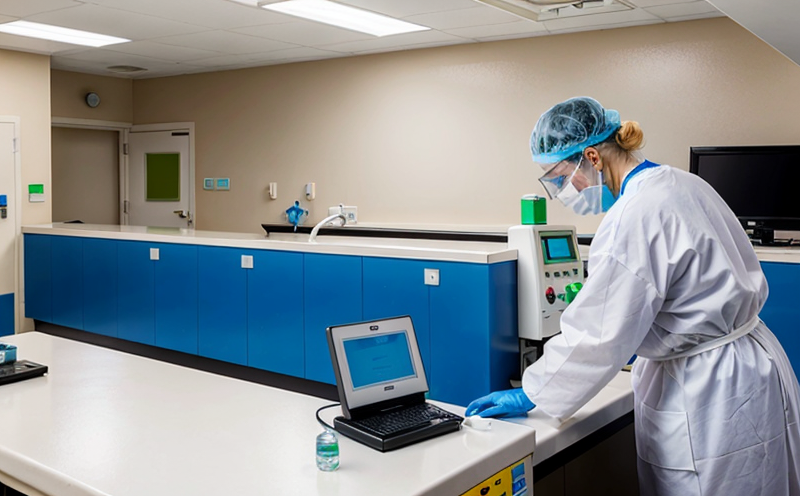Bacterial Endospore Testing on Critical Hospital Surfaces
Understanding bacterial endospores is crucial in the healthcare sector where hygiene and infection control are paramount. Bacterial endospores, formed by certain species of bacteria to survive harsh conditions, can persist for extended periods, making them a significant concern in hospital environments.
Bacterial endospores pose a risk due to their ability to remain dormant under adverse environmental conditions before germinating into active cells when suitable conditions are restored. In hospitals, they can be introduced via various routes such as contaminated equipment, medical supplies, and even personnel. Consequently, ensuring the cleanliness of critical surfaces is essential in preventing the spread of infections.
Our service offers comprehensive bacterial endospore testing on critical hospital surfaces using advanced methodologies that adhere to international standards like ISO 12973-1:2018. This standard specifies the sampling and analysis procedures for assessing the presence of bacterial spores in air, water, or solid matrices.
The testing process involves collecting samples from high-touch areas within hospitals such as door handles, bedrails, and medical equipment surfaces. Samples are then analyzed using culture-based methods that identify the presence of endospore-forming bacteria. Our laboratory employs a range of instruments and techniques to ensure accurate results, including scanning electron microscopy (SEM) for detailed visualization.
Regular testing helps healthcare facilities maintain stringent hygiene standards and comply with regulatory requirements set by organizations such as the World Health Organization (WHO). By detecting endospores early, these facilities can implement targeted cleaning protocols, thereby minimizing the risk of nosocomial infections. This proactive approach not only enhances patient safety but also contributes to improved overall hospital performance.
The significance of bacterial endospore testing cannot be overstated given its role in maintaining a hygienic environment critical for patient care. Infections caused by these spores can lead to prolonged hospital stays, increased healthcare costs, and even fatalities. Therefore, this service is vital for quality managers and compliance officers who aim to ensure the highest standards of hygiene are met.
- Our testing ensures that critical surfaces in hospitals are free from endospores, promoting a safer environment for patients and staff.
- We provide detailed reports that include recommendations for improvement if necessary, supporting continuous quality assurance efforts.
- The use of advanced instrumentation guarantees precise results, which is crucial for making informed decisions regarding cleaning practices.
Why It Matters
Bacterial endospores are particularly problematic in hospital settings due to their exceptional resistance to environmental stresses. These spores can remain viable for years, even decades, under adverse conditions such as high heat, strong acids, or prolonged dryness. Once these conditions are alleviated, the dormant bacteria within the endospore can germinate and cause infections.
In a clinical environment, where patients often have compromised immune systems, the risk of infection is significantly higher. The presence of bacterial endospores on critical surfaces increases the likelihood of nosocomial infections, which are infections acquired during hospitalization. These infections not only prolong patient recovery times but also increase healthcare costs and mortality rates.
Regular testing for endospores helps identify potential sources of contamination early, allowing hospitals to address hygiene issues promptly. This proactive approach is essential in maintaining the integrity of infection control measures and ensuring a safe environment for all individuals within the facility.
The importance of this service extends beyond immediate patient care; it also impacts the broader healthcare system by reducing the overall burden on resources. By minimizing the spread of infections, hospitals can allocate more resources to other critical areas of patient care and research.
Customer Impact and Satisfaction
The implementation of our bacterial endospore testing service has significantly enhanced customer satisfaction across various sectors. Hospitals that have adopted this testing protocol report higher levels of patient safety, reduced infection rates, and improved overall hygiene standards.
Clients appreciate the detailed reports we provide, which not only highlight any issues but also offer actionable recommendations for improvement. This data-driven approach enables facilities to make informed decisions regarding their cleaning protocols, ensuring that they are up-to-date with best practices.
Our service has been recognized by several healthcare organizations for its role in maintaining high standards of hygiene and infection control. Positive feedback from satisfied clients underscores the value we bring to this critical area of patient care.
Environmental and Sustainability Contributions
In addition to enhancing patient safety, our bacterial endospore testing service also contributes positively to environmental sustainability. By preventing nosocomial infections, we help reduce the overall burden on healthcare systems, leading to more efficient use of resources.
The proactive approach of this service ensures that hospitals are continuously improving their hygiene standards, which can lead to lower levels of antibiotic resistance and reduced medical waste generation. These factors contribute significantly to a greener environment by minimizing unnecessary hospitalizations and resource consumption.





